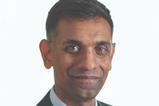Dr Habib Naqvi urges Muslim NHS staff to adapt usual religious and cultural practices during Ramadan and follow social distancing to save lives
The holy month of Ramadan has started, and I would like to send my very best wishes to those Muslim staff working in our NHS, who like me, will be observing this special time of the year.

Fasting plays an important central feature in Islam, as it does in many other religions. There are several exceptions where adult Muslims do not fast during Ramadan. These include individuals that are ill or have a long-term medical condition, such as diabetes, and those that are pregnant, elderly or women undergoing menstrual cycles.
Keeping yourself and loved ones well during Ramadan this year will mean adapting usual religious and cultural practices. This is particularly important for protecting vulnerable people who are shielding because of underlying health conditions as well as family, friends and carers of those who are most vulnerable.
Traditionally Ramadan is a time for communal prayer, spiritual reflection, meals with extended family and friends to break daily fasts, concluding with the community celebration of Eid-Ul-Fitr.
However, this Ramadan will be very different due to the coronavirus pandemic. Mosques will remain closed to help stop the spread of the virus, through social distancing, and of course, we must refrain from visiting friends and family.
The fact is that the whole of the country is making huge efforts and sacrifices during this challenging time. The sentiments behind those endeavours are not separate to what the month of Ramadan represents.
Ramadan teaches us of patience and humility; it reminds us of our shared morals and obligations to others. It also reminds us of the message of empathy to those in hardship and to engage in charity. Of course, these are the values that are being extended to the situation we find ourselves in right now.
To support our staff observing Ramadan during the virus period, we have issued guidance and key advice to NHS managers and staff working in hospitals… to cover matters such as adjustments over the working hours and prayer arrangements
This will be difficult. But, with perseverance and dedication to the cause, we will inshallah (God willing) reduce the impact of the virus on society and get through this challenging period for all of us.
Many of our NHS people are Muslim. Just over 3 per cent of the 1.4 million NHS workforce is from a Muslim background and many of those will be fasting and working at the same time.
To support our staff observing Ramadan during the virus period, we have issued guidance and key advice to NHS managers and staff working in hospitals and healthcare settings to cover matters such as adjustments over the working hours and prayer arrangements for our Muslim staff.
And of course, our Muslim workforce is also an important and integral part of our communities. I would urge colleagues to extend the message of social distancing and encourage others to use alternative approaches to communicate with friends and family – such as online and digital platforms.
The governmental guidance is clear, and it applies during Ramadan. You should only leave the house for very limited purposes:
- shopping for necessities, for example food and medicine, which must be as infrequent as possible;
- one form of exercise a day, for example a run, walk, or cycle – alone or with members of your household;
- any medical need – avoid or escape risk of injury or harm, or to provide care or to help a vulnerable person;
- travelling for work purposes, but only where you cannot work from home.
These reasons are exceptions – even when doing these activities, you should be minimising time spent outside of the home and ensuring you are at least two metres apart from anyone outside of your household.
During this Ramadan, please stay at home with your family and loved ones, let’s protect our NHS and save lives.






























